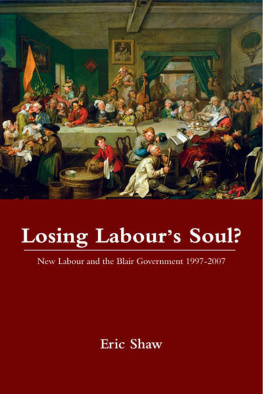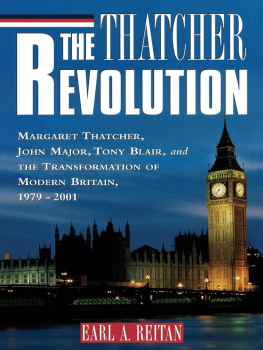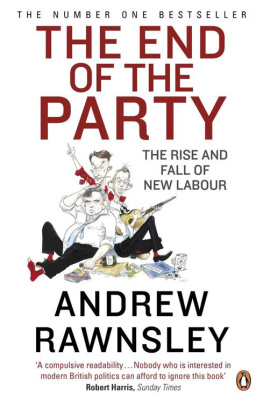Stanford University Press
Stanford, California
English translation 2010 by the Board of Trustees of the Leland Stanford Junior University
The New Labour Experiment: Change and Reform Under Blair and Brown was originally published in French in 2007 under the title Tony Blair 19972007: Le bilan des rformes 2007 Presses de la Fondation nationale des sciences politiques.
No part of this book may be reproduced or transmitted in any form or by any means, electronic or mechanical, including photocopying and recording, or in any information storage or retrieval system without the prior written permission of Stanford University Press.
Library of Congress Cataloging-in-Publication Data
Faucher-King, Florence.
[Tony Blair, 19972007. English]
The New Labour experiment: change and reform under Blair and Brown / Florence Faucher-King and Patrick Le Gals ; foreword by Jonah Levy.
p. cm.
Revised, updated translation of: Tony Blair, 19972007. [Paris] : Presses de la Fondation nationale des sciences politiques, c2007.
Includes bibliographical references.
ISBN 978-0-8047-6234-2 (cloth : alk. paper)
ISBN 978-0-8047-6235-9 (pbk. : alk. paper)
ISBN 978-0-8047-7621-9 (electronic)
1. Labour Party (Great Britain). 2. Blair, Tony, 1953. 3. Brown, Gordon, 1951. 4. Great BritainPolitics and government19972007. 5. Great BritainPolitics and government2007. I. Le Gals, Patrick. II. Title.
JN1129.L32F3513 2010
324.2410709.0511dc22
2009046620
Printed in the United States of America on acid-free, archival-quality paper
Typeset at Stanford University Press in 10.5/15 Minion
Thank you to Lila for bringing fun, play, and sunshine into my lifeFlorence
To Robin and TiphainePatrick
Foreword by Jonah Levy
Florence Faucher-King and Patrick Le Gals have crafted an incisive, readable analysis of the Blair-Brown years in Britain. The book is neither a detailed policy study nor a grand theoretical treatise. Rather, it is an analytical essay, theoretically informed, that paints the broad brushstrokes of New Labours decade in power, while grappling with its larger meaning. The book focuses primarily on domestic policy and governance; issues of foreign policy, such as Tony Blairs relationship with George Bush and the decision to go to war in Iraq, figure less prominently. The books greatest strength lies in drawing out the implications for left-wing parties that are seeking to adapt to a world of neoliberal globalizationin particular, the implications for policy, governance, and party organization.
New Labour has pursued two main goals. The first is to improve social justice in what is essentially a neoliberal economic order without disturbing the mechanisms that allow that order to function. Alongside this economic objective, New Labour has pursued a second, more political or electoral objective. Here, the goal has been to transform the Labour Party into a cross-class party, able to appeal beyond its shrinking working-class ghetto to Britains middle class.
These goals are not all that different from those of the Democratic Party in the United States under Bill Clinton or Barack Obama. What is different, however, are the means deployed by New Labour. Faucher-King and Le Gals describe how Blair and Brown have made aggressive use of state power. As French academics, Faucher-King and Le Gals know of what they speak. But whereas state authorities in France have generally endeavored to steer or direct the market, New Labour has sought to bend the population to the logic of the market, to create a market society, as the authors describe it, borrowing from Karl Polanyi.
New Labours statist approach has multiple origins. Scholars have long noted that Britains political systemwith its cabinet government, first-past-the-post electoral law, unwritten constitution, and limited judicial reviewgives the prime minister tremendous capacity to pursue his or her ambitions. But Faucher-King and Le Gals point to two more intriguing reasons for New Labours statism.
The first is the obsession with avoiding a repeat of Labours last governing experience in the late 1970s. The Callaghan government was unhinged and the door to Margaret Thatcher opened, not only by poor economic management but also by a perceived inability to govern, to stand up to the trade unions, as crystallized in the unrest of the so-called Winter of Discontent (197879). Labour then spent eighteen years in helpless opposition, as Thatcher and John Major moved the country in a sharply neoliberal direction, in no small part the result of the partys internal divisions and ideological posturing. For Blair and Brown, then, showing that New Labour is competent to govern means projecting a unified message and controlling the rank and file. Order is to be preferred over spontaneity and feedback.
The second reason for New Labours statism, as highlighted by Faucher-King and Le Gals, is intellectual as opposed to historical. Blair and Brown have displayed a tremendous faith in social engineering. The state, using all manner of audits and quantitative evaluations, can tightly manage complex organizations, such as the National Health Service (NHS). It can also deploy carrots and sticks to incentivize individuals to behave in a socially desirable manner, to take up jobs instead of crime. Although New Labour is often portrayed as continuing or tinkering with the Thatcher legacy, Faucher-King and Le Gals show that, in fact, it has been pursuing a highly ambitious, activist agenda.
How has this activist agenda fared? In the economic and social arena, Faucher-King and Le Gals indicate that the record looked reasonably good (albeit with a number of caveats). Blair and Brown presided over a decade of strong growth, low unemployment, and sound public finances. While reassuring business and financial interests, the government managed to find resources for an array of antipoverty programs, primarily tax credits for working families, that helped to reduce poverty significantly. The government was also able to make massive investments in long-neglected public services, most notably education and health care.
Statist social engineering played a critical role in legitimating this increased public spending. Antipoverty programs were targeted at working families: pressure was intensified on the unemployed to take jobs, and those who remained outside the workforce often saw their benefits reduced. Reflecting an almost Victorian ethic, the British state would reward work, while punishing indolence (or incapacity). In deference to middle-class values of frugality, the state would also ensure that money was well spent: increased funding for health and education was coupled with the new public management methods inaugurated by the Conservatives. Whether practicessuch as the separation of purchasers from providers, so-called public-private partnerships, Private Finance Initiatives (PFIs), and a multitude of audits and quantitative performance indicatorsactually improved the quality and efficiency of public services is a matter of considerable dispute. What is beyond dispute, however, is that these practices provided political cover to a New Labour government that was spending a lot of money on Old Labour priorities, from fighting poverty to improving health care and education.











